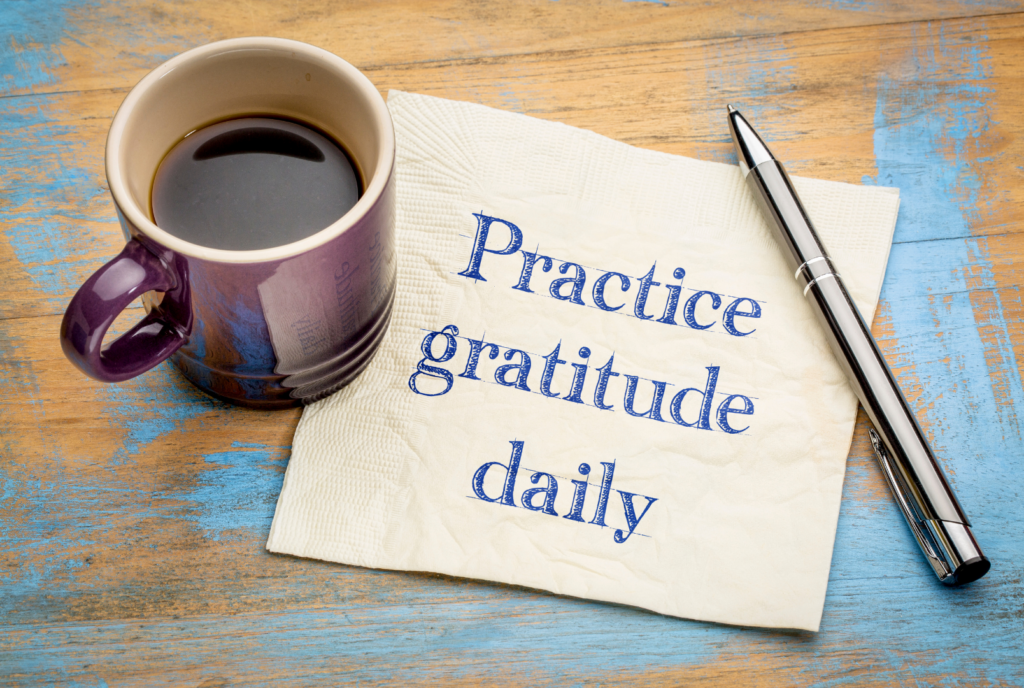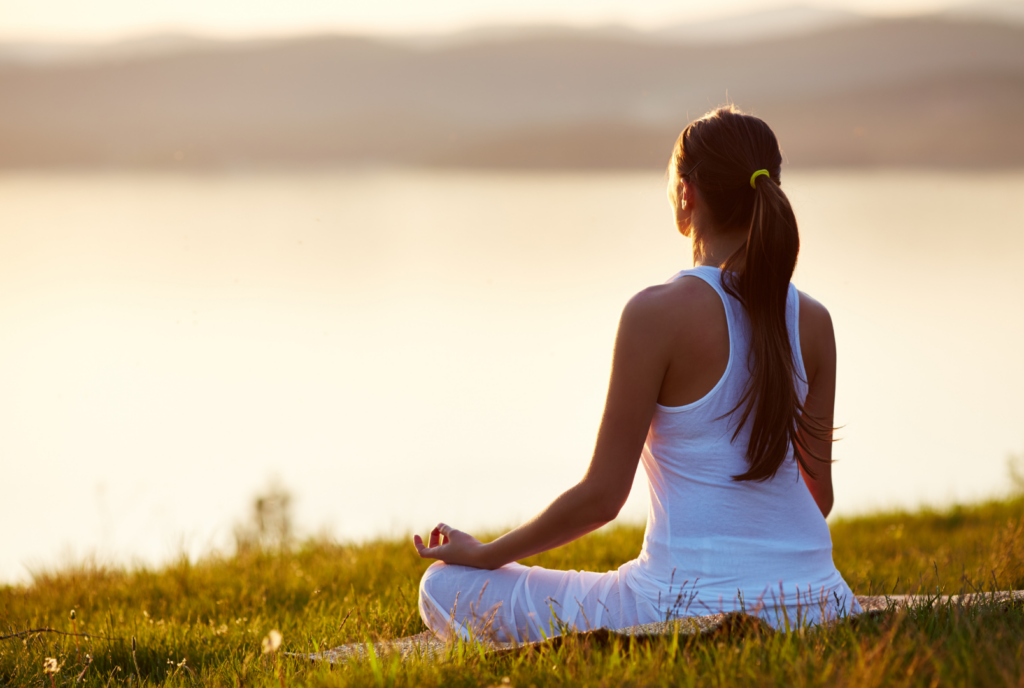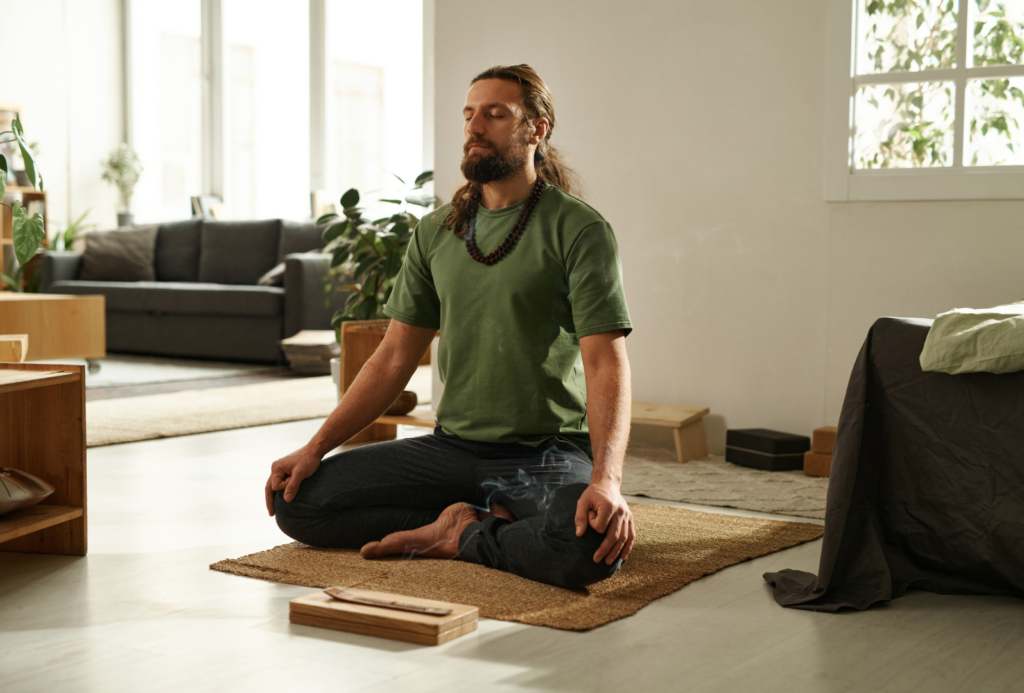Learn to manage stress with gratitude and meditation in 2025. Find out chronic stress effects and science-backed benefits, and create a routine for a positive new year!
Disclaimer
The content on this website is intended for informational purposes only and is not a substitute for professional medical advice, diagnosis, or treatment. Always seek guidance from a qualified healthcare provider or licensed medical professional before changing your medications, diet, exercise, or health routine. Discuss any information from this website with your healthcare provider to determine its relevance and suitability for your individual health needs.
By 2025, stress will likely weigh even heavier on many of us. It’s hard to escape the pressure—from meeting deadlines at work to staying afloat in a sea of social media updates, and the uncertainty of our world can all pile up.
If you’ve been feeling overwhelmed with stress and anxiety, you’re not alone. Stress is a natural response to challenges, but when it builds up, it can hurt your physical and mental health. Learning to manage it with practices like gratitude and meditation can make a big difference.
Table of Contents
What is Stress?
Before we dive into how gratitude and meditation can help, it’s important to understand what stress is.
Stress is a feeling of worry or mental tension brought on by a difficult situation. Stress is the body’s natural response to a challenge or demand. When you face a stressful situation, your body releases hormones like adrenaline and cortisol, which prepare you to either fight or flee.
While this response is helpful in life-threatening situations, it becomes problematic when stress is chronic and occurs without relief. Chronic stress can weaken the immune system and make lots of other health problems worse.
How do I know if I have chronic stress?
While short-term stress can be helpful, chronic stress can have serious consequences for both the body and the mind, causing several physical and mental health issues.
Physical effects of chronic stress

Physical effects of chronic stress include issues like
• High blood pressure,
• Digestive problems,
• Obesity,
• Skin problems,
• Sexual dysfunction,
• Headaches or other pains throughout the body,
• Stiffness in the muscles, particularly the jaw or neck,
• A weakened immune system.
Chronic stress increases the chance of developing serious conditions, namely, heart disease and stroke.
Mental effects of chronic stress
Chronic stress has a severe impact on our mental health. It goes beyond simply feeling overwhelmed. Over time, it can result in burnout, anxiety, and depression. Sometimes, the tension lasts so long that it causes panic attacks or worsens already existing mental health issues.
This creates a frustrating cycle; when stress feels unending, it can leave you feeling stuck, completely drained, and perpetually on edge.
Here are some common signs of chronic stress:
• Struggling to get enough sleep—or sleeping too much
• Constant fatigue
• Forgetting things or having trouble focusing
• Feeling irritable or easily annoyed
• Dealing with anxiety or depression
When stress persists, it can interfere with daily life, making it more challenging to focus or perform well at school or work.
Why is it important to manage stress?
It’s normal to feel stressed, but learning how to deal with it is very important. We now know that stress can hurt both our bodies and our minds if we don’t do anything about it.
On the flip side, learning to handle stress can help you stay focused, healthy, and in control. When you manage stress well, tackling challenges like studying for tests, handling responsibilities, or dealing with conflicts is easier. It also boosts your mood, making life more enjoyable.
Managing stress doesn’t mean you’ll never feel it again—it’s about keeping it from overwhelming you. With the right tools, you can turn stress into a source of motivation instead of frustration.
How Does Gratitude Relieve Stress?

What is Gratitude?
Gratitude is the feeling of thankfulness and appreciation for the good things in life. It’s about recognizing and being mindful of the positive experiences, people, or things that bring value and joy to your life, no matter how big or small they may be.
For example, it can be as simple as appreciating a sunny day, feeling thankful for a kind gesture from a friend, or being grateful for your health and home. Gratitude isn’t just about what happens to you—it’s a mindset that helps you focus on what you have rather than what you lack.
However, it can also be a deeper, more regular habit. For example, keeping a gratitude journal and writing down three things you’re grateful for every day.
Is there science behind gratitude?
A lot of research has been done on how being grateful can help your mental health and help you deal with stress. According to research, expressing gratitude on a regular basis can significantly reduce stress and anxiety.
Our “feel-good” chemicals, like Dopamine and serotonin, are released when you focus on the good things that have happened. These “feel-good” chemicals help balance out the effects of stress hormones like cortisol, making you feel better overall.
Emmons and McCullough’s study from 2022 found that people who constantly practised gratitude had lower levels of depression and stress and were more likely to do healthy things like going to the gym regularly or reaching out to friends for support. This is because being thankful makes you think positively, which in turn helps you deal with stress in better ways.
Gratitude has also been shown to help people sleep better, which is related to worry and anxiety. People who kept gratitude journals or took the time every day to write down what they were grateful for, reported that they slept better. Better sleep helped them deal with stress better.
How to Practice Gratitude

Adding gratitude to your daily routine doesn’t have to be hard. Here are some simple ways to practice it:
• Express Gratitude to Others: Saying “thank you” to a coworker, family member, or friend can make you feel better right away. It also makes your relationships stronger, which helps you deal with stress better.
• Gratitude Journaling: Every day, write down three things you’re grateful for. It can be a big one, such as a promotion at work or a small one like a nice cup of coffee in the morning. Over time, you’ll begin to notice more of the good around you, which shifts your focus away from stressors.
• Gratitude Jar: Keep a jar where you drop notes about things you’re thankful for. At the end of each month or year, go through the jar and reflect on the positive moments, which can help you feel more connected to the good in your life.
Gratitude in 2025
In 2025, things will most probably be not that different than the prevous years. The challenges of the modern world will be there, and it will be easy to get caught up in the stress of daily life. However, gratitude practices can act as an antidote.
While stress and anxiety levels may be high due to ongoing global issues, personal and economic challenges, or technological overload, gratitude offers a simple and effective way to restore balance.

Practices like gratitude journaling or expressing thanks can help you step away from overwhelming emotions and refocus on the positive. Furthermore, in our digital age, there are countless apps and online resources which you can use to track and develop a consistent gratitude practice, making it easier than ever to start in 2025.
How does meditation reduce stress?

What is Meditation?
Meditation is a mental exercise that encourages relaxation, focus, and awareness. Meditation has many forms, but at its foundation, it is about quieting the mind and becoming more mindful of your feelings, thoughts, and body.
Meditation has been practised for thousands of years across various cultures, but in modern times, it’s especially popular for its mental health benefits, particularly in stress relief.
Meditation works by allowing you to temporarily “turn off” the stress responses that are activated during stressful situations. It affects the body in the opposite way that stress does. When you meditate, your brain enters a state of deep relaxation.
This reduces the production of cortisol and helps lower heart rate and blood pressure. Over time, regular meditation can help you feel less reactive to stress and develop a more balanced emotional state.
Is there any scientific evidence for the benefits of meditation?
• Stress and Anxiety
There is a lot of evidence that meditation can help with worry and anxiety. A good deal of research has discovered that meditation can lower cortisol levels (a hormone that makes you feel stressed) and raise alpha brain waves that make you feel calm and relaxed.
By regularly practising meditation, individuals can rewire their brains to respond to stress more effectively and feel less anxious overall.
• Hypertension
According to scientific studies, meditation can help regulate high blood pressure. Meditation promotes relaxation and reduces stress improving blood flow and reducing strain on the heart and blood vessels. According to clinical studies, regular meditation practice can result in considerable drops in blood pressure, meaning the potential benefits for heart health.
• Chronic pain
When you have chronic pain, as a result of the ongoing discomfort and limitations to perform daily activities, you may suffer from increased anxiety. Regular meditation may help reduce stress and worry by calming your mind and improving your ability to manage pain over time.
• Sleep
Meditation can also help people who have trouble sleeping, which is common for people who have constant, chronic pain. Sleep is important for repairing, but people who are in pain all the time may find it hard to get the rest they need. Meditation can help people with chronic pain relax and sleep better, which can help them deal with their pain better.
• Age-Related Memory Loss
Research shows meditation benefits cognitive function in younger and middle-aged adults, indicating its potential to offset or enhance mental abilities in older adults.
• Focus and concentration
Meditation trains the mind to stay in the moment and avoid distractions, which helps people concentrate better. The goal of meditation is to practice focusing on one thing, like your breath or a phrase. This makes it easier to focus and remember things.
Over time, regular practice can make it easier to maintain focus in daily life by reducing the tendency to become distracted, promoting a calm and clear mind that can better concentrate on tasks.
For people who are severely deficient, high-dose Vitamin D therapy may be recommended by a doctor to quickly raise levels. To avoid toxicity, a medical worker should continually monitor this method.
Types of meditation
Below, let’s look at the three most popular types of meditation. Each has its unique benefits for stress relief:
• Mindfulness Meditation
Through mindfulness meditation, you may teach your brain to remain calm and targeted. It helps you focus on the present without getting sidetracked.
This practice has two main steps: attention and acceptance. The first step, attention, means focusing on your breathing, your thoughts, how your body feels, or the emotions you’re experiencing right now. The second step, acceptance, is about noticing those thoughts and feelings without judging them. You don’t respond to them; instead, you watch them and let them go.
This simple practice that can bring more clarity and calmness into your life.
Researchers have studied mindfulness in over 200 studies involving healthy people and found that it’s very effective for lowering stress, anxiety, and depression. It can also help with specific challenges like managing pain, quitting smoking, and overcoming addiction.
Mindfulness meditation can be good for your physical health as well as your mental health. People who have chronic pain may feel less pain, tiredness, and stress. Early study shows that it might make the immune system stronger and help people get better faster from colds and the flu.
• Visualization Meditation

Visualization meditation is a practice that combines meditation with imagining positive outcomes. You focus on a specific area of your life, like your job, relationships, or finances, and picture the best-case scenario. Usually, it starts with imagining your goals clearly and in detail. Then you think about where you want to be and what you want to achieve over time, visualize yourself making progress and reaching those goals, imagining your life when that goal comes true.
If worries or fears come up, you’ll let them pass without giving them too much attention. Instead, focus on a future moment where you’ve made progress. Picture the steps you’ll take to get there and how your life will look once you achieve your goal.
• Loving-kindness Meditation (LKM)
LKM, or loving-kindness meditation, is an ancient Buddhist practice that helps people be more kind and friendly to themselves and others. When you practise LKM, you focus on being kind to yourself and others, building up to all living things, seen and unknown, in the universe.
A new study has shown that LKM improves mental health in many ways, such as making us less critical of ourselves, quieting our inner critic, and accepting ourselves more (Shahar et al., 2015).
LKM might slow down the ageing process of cells by stopping the telomeres from getting shorter, which happens with ageing (Le Nguyen et al., 2019).
Pilot studies on people with chronic back pain and migraines showed that practising loving-kindness meditation for short amounts of time made their pain symptoms better and helped them do their daily tasks more easily and comfortably.
Getting Started with Meditation in 2025
Finding the time to meditate sometimes seems challenging in today’s fast-paced world. But thanks to advancements in technology, meditation can be easily included in your daily schedule. Multiple apps like Headspace, Calm, Simple Habit, and Insight Timer offer guided meditations for the newbies.
Many of these apps offer regular reminders meant to keep you on track. You can create a routine that fits into your lifestyle using these tools.
Combining Gratitude and Meditation for Maximum Stress Relief
Both gratitude and meditation can help reduce stress on their own, but when you combine them, they work even better. Together, they help shift your focus and create emotional balance, making it easier to handle stress.
Meditation calms your mind by keeping your attention on the present moment, giving you space from your worries. It calms you down, teaches you how to handle your feelings, and helps you rest. On the other hand, meditation by itself can sometimes let bad thoughts in. That’s where becoming grateful comes in.
Gratitude helps you focus on positive things, like what you appreciate or value in your life. This can make meditation even more powerful.
Practical Ways to Combine Gratitude and Meditation
Here are some simple strategies to incorporate thankfulness and meditation into your everyday routine:
• Start with meditation
Spend 5–10 minutes sitting quietly and focusing on your breathing. Allow yourself to feel peaceful and centred.
• Think About Gratitude
After you’ve meditated, take some time to think about things you’re thankful for. It could be small joys, like a tasty cup of coffee, or bigger things, like a recent success.
• Try Guided Sessions
Use apps like Calm or Insight Timer for guided meditations that focus on gratitude. These combine both practices into one easy session.
• Mindful Gratitude Walk
Go for a walk and pay attention to the world around you. Notice the sights, sounds, and smells while reflecting on things that make you happy.
Combining gratitude and meditation can help you feel calmer, more positive, and better handle life’s challenges.
Overcoming Challenges in Practicing Gratitude and Meditation

Common Obstacles
Gratitude and meditation are both great ways to deal with stress, but they also have some problems.
For a lot of people, the hardest part is to start. Life can be busy, and it may seem hard to find time to relax or be thankful, especially when stress levels are high.
Another common problem is scepticism. Some people may feel that gratitude is too simple or that meditation is too “abstract” to really help them. People may not fully engage in these activities because they have these doubts.
Solutions to overcome challenges
Here are a few methods to help you overcome typical challenges:
-
Set realistic goals
Start small. Aim for only 5 minutes of meditation or gratitude practice every day. Gradually increase the time as you become more comfortable.
-
Use guided sessions or apps
For those who struggle to meditate alone, apps or YouTube videos can help. They provide structure and guidance, making the process feel less overwhelming
-
Make it a habit
Include gratitude and meditation into your daily routine by connecting them to current habits, such as drinking coffee in the morning or going to bed. This promotes consistency.
-
Begin with gratitude
If you’re not ready for meditation, start by practising gratitude. Keep a gratitude notebook or mentally list what you’re grateful for at the start and finish of each day.
Importance of Regular Practice and Building a Routine
Gratitude and meditation are great ways to deal with stress, but you must do them regularly to get the most out of them. It’s like working out: once won’t change much, but doing it often will.
It’s been shown that regular meditation or practising gratitude can change the way your brain works, making it easier to deal with emotions and worry. You’ll be able to handle stress better when it comes up because this strengthens you mentally over time.
You don’t have to practice for an hour every day if you can instead. Making it a regular part of your day is the most important thing.
Conclusion
As we approach 2025, we will experience varying levels of anxiety and stress. So, effective stress management is crucial.
Meditating and practising gratitude will help lower stress and improve mental as well as physical health.
Adding these two simple activities to your daily routine can help you feel calmer, more mindful, and emotionally balanced. The great thing about gratitude and meditation is that they don’t cost anything, are easy to access, and can fit into any lifestyle.
In 2025, when life seems overwhelming, take a step back, breathe, and focus on the good. Over time, the cumulative impact of these activities will make you feel more robust, peaceful, and ready to tackle whatever obstacles come your way.
So, start today and explore how gratitude and meditation may improve your life in the coming year.
References
- https://medlineplus.gov/ency/article/003211.htm , Stress and your health
- https://www.tandfonline.com/doi/pdf/10.1080/17437199.2020.1760727 ; Adam Koncz, Zsolt Demetrovics & Zsofia K. Takacs (2021) Meditation interventions efficiently reduce cortisol levels of at-risk samples: a meta-analysis, Health Psychology Review, 15:1, 56-84, DOI: 10.1080/17437199.2020.1760727; accessed Dec 12, 2024, 10.52 pm
- https://www.cdc.gov/howrightnow/gratitude/index.html, Gratitude Works; accessed Dec 12, 2024. 1.05 am
- https://hbr.org/2020/10/use-gratitude-to-counter-stress-and-uncertainty ; Use Gratitude to Counter Stress and Uncertainty, by Christopher Littlefield ; October 20, 2020; accessed Dec 12, 2024, 1.02 am
- Emmons The Psychology of Gratitude. Oxford University Press ; https://books.google.ae/books?hl=en&lr=&id=_UbiBwAAQBAJ&oi=fnd&pg=PA248&dq=Emmons,+The+Psychology+of+Gratitude.+Oxford+University+Press&ots=gmPvFQdaOB&sig=TP3wcxk5SKh3szy1pcKP-j15H-c&redir_esc=y#v=onepage&q=Emmons%2C%20The%20Psychology%20of%20Gratitude.%20Oxford%20University%20Press&f=false ; accessed Dec 12, 2024, 1.42 am
- https://www.apa.org/topics/mindfulness/meditation, Mindfulness meditation: A research-proven way to reduce stress; accessed Dec 09, 2024, 10.25 pm
- Le Nguyen, K. D., Lin, J., Algoe, S. B., Brantley, M. M., Kim, S. L., Brantley, J., Salzberg, S., & Fredrickson, B. L. (2019). Loving-kindness meditation slows biological aging in novices: Evidence from a 12-week randomized controlled trial. Psychoneuroendocrinology, 108, 20–27. https://doi.org/10.1016/j.psyneuen.2019.05.020
- https://positivepsychology.com/loving-kindness-meditation/#:~:text=Loving%2Dkindness%20meditation%20(LKM),the%20practice%20according%20to%20research. ; What Is Loving-Kindness Meditation? (Incl. 4 Metta Scripts); 27 Jul 2019 by Jo Nash, Ph.D.
- https://neurosciencenews.com/medication-cortisol-stress-19443/ ; Hair Samples Show Meditation Training Reduces Long-Term Stress; October 9, 2021; accessed Dec 12, 2024; 11.22 pm
- https://pubmed.ncbi.nlm.nih.gov/28863392/ ; Mindfulness mediates the physiological markers of stress: Systematic review and meta-analysis; accessed Dec 21, 2024; 2.32 pm
- https://pmc.ncbi.nlm.nih.gov/articles/PMC10739252/ ; Meditation: A Promising Approach for Alleviating Chronic Pain; accessed Dec 21, 2024; 2.52 pm
- https://pmc.ncbi.nlm.nih.gov/articles/PMC4024457/ ; The potential effects of meditation on age-related cognitive decline: a systematic review; accessed Dec 21, 2024, 2.23 pm
- https://www.tandfonline.com/doi/pdf/10.1080/17437199.2020.1760727 ; Adam Koncz, Zsolt Demetrovics & Zsofia K. Takacs (2021) Meditation interventions efficiently reduce cortisol levels of at-risk samples: a meta-analysis, Health Psychology Review, 15:1, 56-84, DOI: 10.1080/17437199.2020.1760727; accessed Dec 12, 2024, 10.52 pm
- https://www.cdc.gov/howrightnow/gratitude/index.html, Gratitude Works; accessed Dec 12, 2024. 1.05 am
- https://hbr.org/2020/10/use-gratitude-to-counter-stress-and-uncertainty ; Use Gratitude to Counter Stress and Uncertainty, by Christopher Littlefield ; October 20, 2020
- Emmons The Psychology of Gratitude. Oxford University Press ; https://books.google.ae/books?hl=en&lr=&id=_UbiBwAAQBAJ&oi=fnd&pg=PA248&dq=Emmons,+The+Psychology+of+Gratitude.+Oxford+University+Press&ots=gmPvFQdaOB&sig=TP3wcxk5SKh3szy1pcKP-j15H-c&redir_esc=y#v=onepage&q=Emmons%2C%20The%20Psychology%20of%20Gratitude.%20Oxford%20University%20Press&f=false
- https://www.apa.org/topics/mindfulness/meditation, Mindfulness meditation: A research-proven way to reduce stress
- Le Nguyen, K. D., Lin, J., Algoe, S. B., Brantley, M. M., Kim, S. L., Brantley, J., Salzberg, S., & Fredrickson, B. L. (2019). Loving-kindness meditation slows biological aging in novices: Evidence from a 12-week randomized controlled trial. Psychoneuroendocrinology, 108, 20–27. https://doi.org/10.1016/j.psyneuen.2019.05.020
- https://neurosciencenews.com/medication-cortisol-stress-19443/ ; Hair Samples Show Meditation Training Reduces Long-Term Stress; October 9, 2021
- https://pubmed.ncbi.nlm.nih.gov/28863392/ ; Mindfulness mediates the physiological markers of stress: Systematic review and meta-analysis








